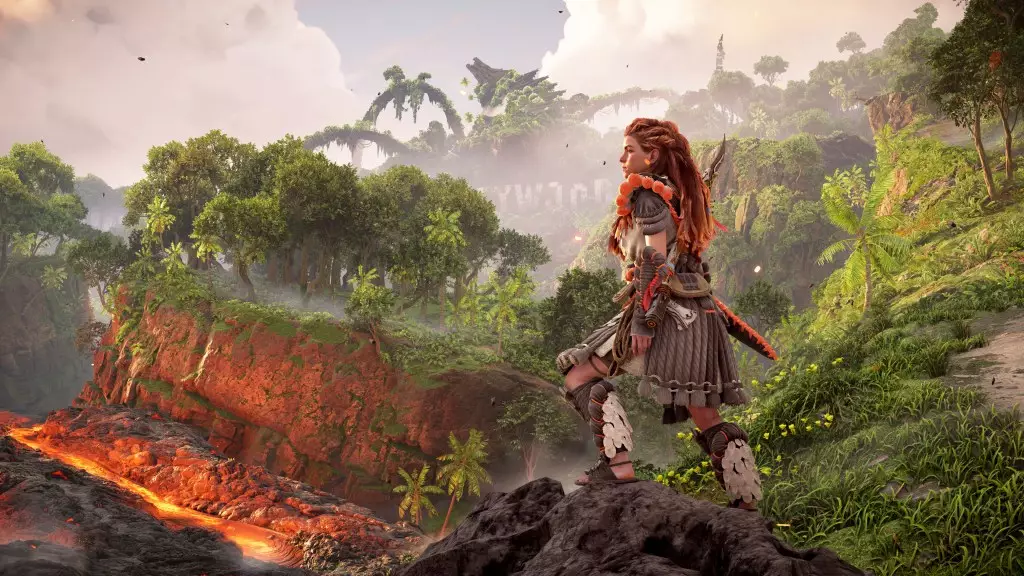In an era where artificial intelligence (AI) is revolutionizing various industries, Sony’s PlayStation brand is stepping onto the field with its own integration strategies. While Microsoft showcases its AI capabilities in gameplay ideation and prototyping, PlayStation seems to have adopted a more understated approach. By focusing its AI initiatives on frame generation and enhancing hardware functionality, Sony is not merely trailing behind its competitors; rather, it appears to be cautiously strategizing its evolution in the gaming domain. However, a recent leak hints at a potentially transformative phase for Sony’s approach to software development within its gaming ecosystem.
The introduction of AI into gaming isn’t just an abstract concept reserved for speculative discussions. It is rapidly becoming a tangible reality, as suggested by a now-removed YouTube video that surfaced, showcasing AI-driven interactions featuring Aloy, the beloved protagonist from the critically acclaimed *Horizon* series. This internal demonstration, narrated by Sharwin Raghoebardajal, who holds the significant title of Director of Software Engineering at Sony, aims to probe the limits of AI’s capabilities in creating more immersive gaming experiences. Leveraging technologies like OpenAI’s Whisper for speech recognition and GPT-4 alongside Sony’s own advancements, the demo hints at an ambitious reimagining of player-character interactions.
The Relationship Between AI and Storytelling
Engaging narratives have long been a cornerstone of gaming—especially for franchises like *Horizon*, celebrated for their intricate storytelling and compelling character arcs. One can’t help but question whether AI-driven conversations can truly enhance this narrative richness. While exploiting AI enables real-time dialogue and interactions that feel organic, there’s an intrinsic value in the carefully scripted exchanges that human writers and voice actors provide. It feels almost sacrilegious to suggest AI-generated conversations could replicate the emotional depth crafted by a talented team of creatives.
On the other hand, the potential for AI to add layers to storytelling cannot be dismissed outright. The prototype demo demonstrates how Aloy could dynamically respond to players in real-time, possibly providing a more personal connection to the game. Nonetheless, it raises ethical questions about the very future of gaming in terms of artistic integrity. When AI is used as a crutch for character development rather than a tool for facilitating deeper engagement, the uniqueness of video games as a storytelling medium may be significantly compromised.
Voices Behind the Characters
A critical aspect that surfaces after examining the demo is the role of voice actors in this evolving landscape. SAG-AFTRA, the labor union representing over 160,000 actors and performers in the film and television industry, is currently navigating its own murky waters concerning AI advancements. With conditional strikes ongoing regarding the protection of jobs against AI encroachments, there is a palpable tension around how AI will affect the roles of voice actors renowned for their depth and ability to imbue characters with personality.
The seamless integration of AI doesn’t just affect writing; it bleeds into the performances of skilled voice actors. Using AI-generated voice synthesis to animate characters raises the specter of replacing human talent with algorithms, which could lead to job loss and diminish the richness of character portrayals in games. Ashley Burch, who voices Aloy, exemplifies the kind of nuanced performance that AI may struggle to replicate. This tension between technological advancement and artistic merit is crucial as we envision the future of gaming.
The Road Ahead for AI in Gaming
As exciting as this technology might sound, the crucial question remains: will the integration of AI improve gaming experiences, or will it dilute the heart and soul that makes games resonate with players? Sony appears to be navigating this conundrum cautiously, acknowledging the potential pitfalls while exploring the innovative frontiers that AI can provide. There’s a delicate balance between enhancing player interaction and maintaining the ethos of storytelling, which is critical for the longevity of any gaming franchise.
Embracing AI does not have to mean sacrificing the essence of human involvement in story creation. Instead, it could be an opportunity to blend technology with traditional craftsmanship, prompting a dialogue about how video games can evolve. As we stand on the cusp of this new era, it remains essential for key players, including Sony, to tread thoughtfully, ensuring that innovation does not overshadow the core values inherent in storytelling and artistic expression. The ongoing advancements in AI present both thrilling opportunities and formidable challenges, which will inevitably shape the future of the gaming landscape.

